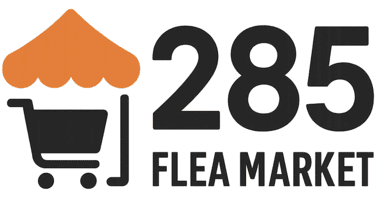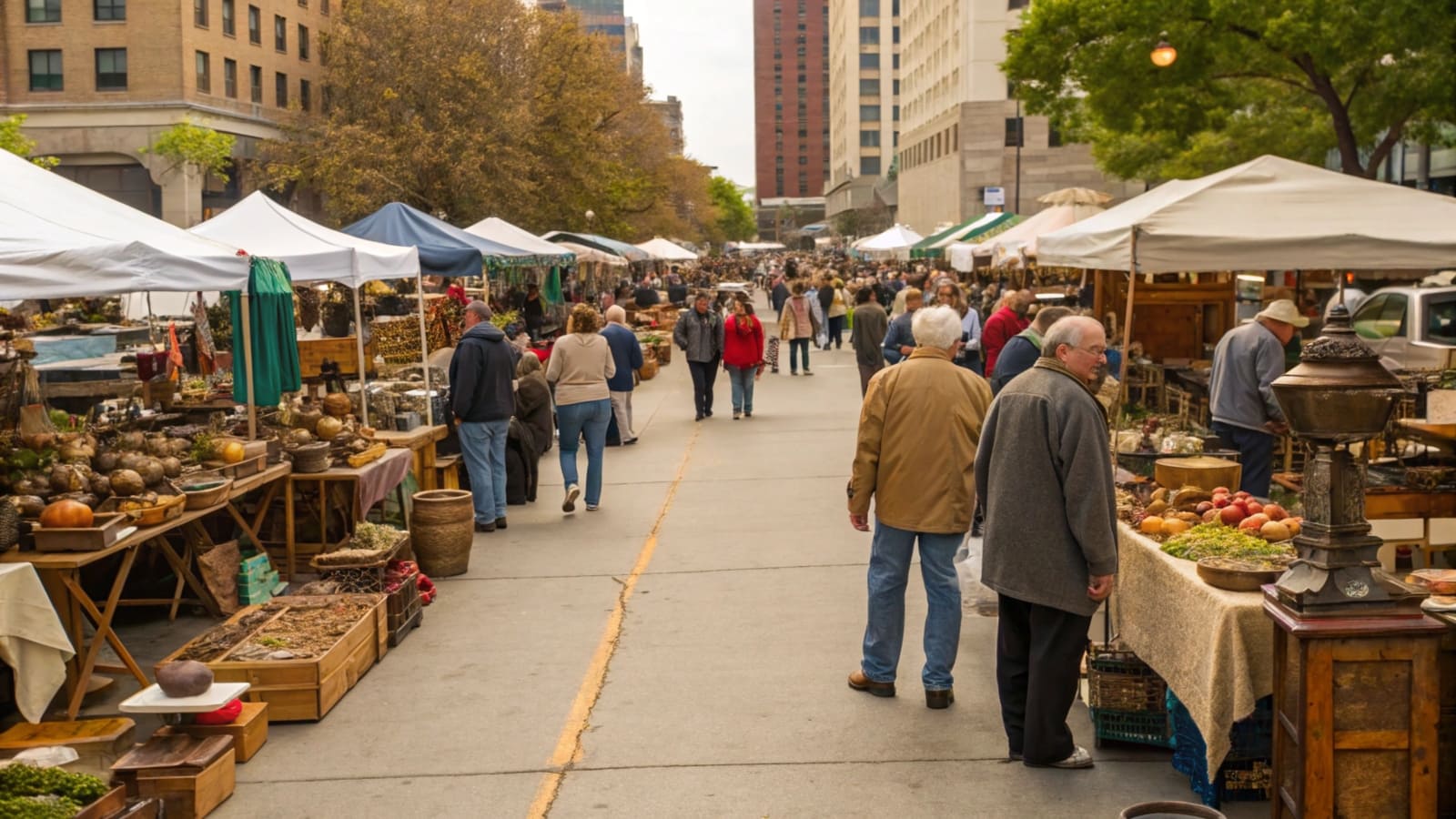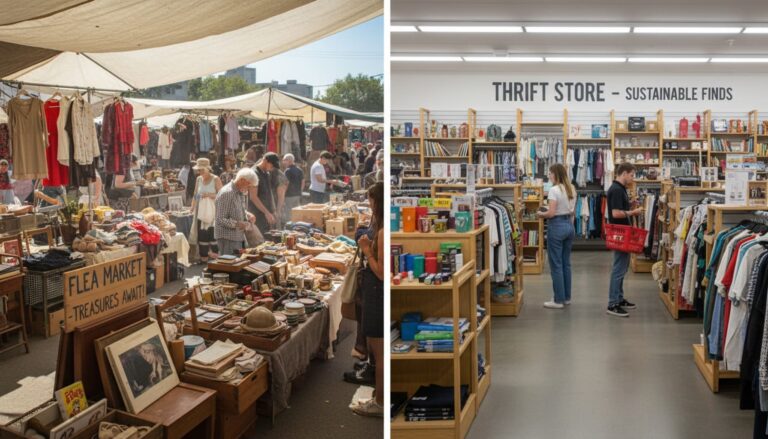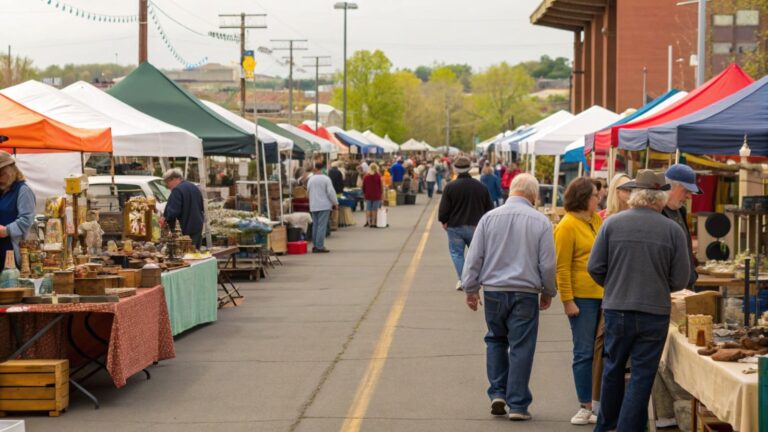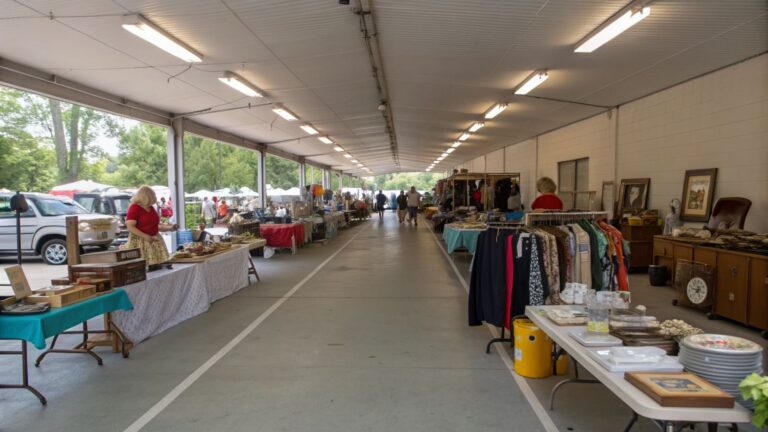You ever drive past a big handwritten sign—“Market Today”—and wonder if it’s worth pulling over? You don’t know if it’ll be folks selling old lamps and VHS tapes, or farmers with crates of tomatoes still warm from the sun. Sometimes it’s both. Sometimes it’s chaos. And that’s what makes the whole flea market vs farmers market thing worth unpacking.
This isn’t just about “where to shop.” It’s about vibe, about purpose, about what you end up carrying home and how you feel after. Let’s get into it.
So, What’s a Flea Market Really?
Picture rows of tables under sun-faded tents. A jumble of furniture with scratches you secretly like, stacks of vinyl records that smell faintly of attic dust, a box of mismatched silverware somebody swears is collectible. That’s a flea market.
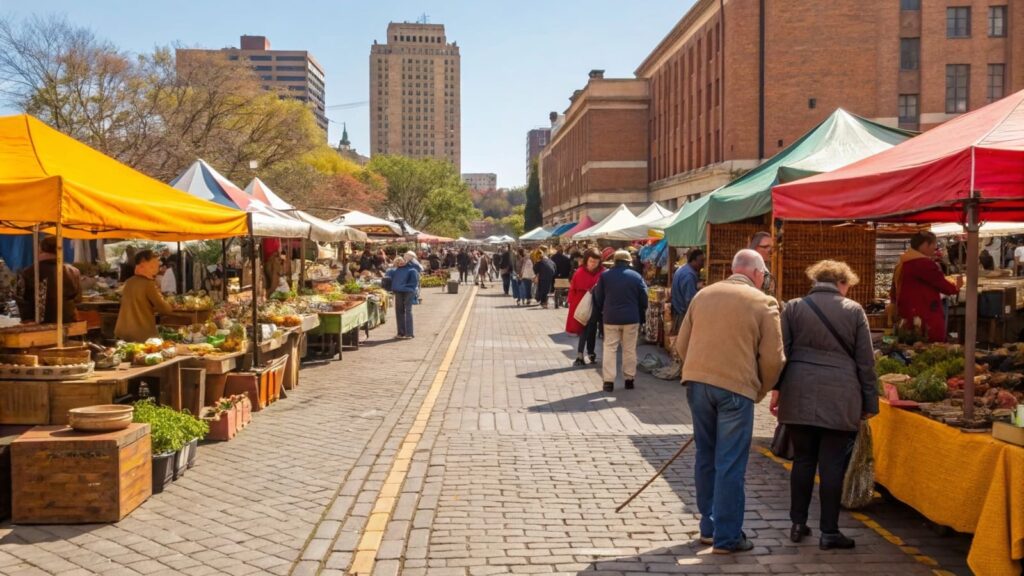
- Where it started: The phrase marché aux puces (literally “market of fleas”) came from Paris. People were reselling old textiles—probably with a few critters clinging on. The name stuck.
- Who’s there: Resellers, people clearing out storage units, crafty folks making jewelry out of spoons. You never quite know.
- What you’ll find: Antiques, clothes, retro toys, rusty tools, bizarre gadgets, refurbished bikes, art both terrible and brilliant.
The atmosphere is less grocery run, more treasure hunt. Half the fun is digging, half is bargaining, and sometimes you leave with nothing except a weird story.
And a Farmers Market?
Completely different energy. Stalls lined with piles of peaches, carrots with dirt still clinging to the roots, honey in mason jars catching the morning light. It smells like bread or coffee or basil depending where you stand.
- Origins: Before grocery chains, farmers markets were just… how people got food. Grower to buyer, simple.
- Who’s there: Farmers, bakers, cheesemakers, beekeepers, that one guy selling 18 types of mushrooms you can’t pronounce.
- Products: Seasonal produce, fresh meat, eggs with yolks so orange they look fake, dairy, jams, fresh-cut flowers. Sometimes soap or candles if the market rules allow.
The atmosphere? Friendly, almost slow. People chat with growers, ask about recipes. Kids pet goats. There’s usually a band playing something acoustic in the background.
Where They Overlap
- Both are community events, not faceless corporate stores.
- Both make you feel like you stumbled onto something unique.
- Both often pop up on weekends and pull in food trucks or live music to keep folks hanging around.
That’s pretty much where the similarities stop.
Where They Split Apart
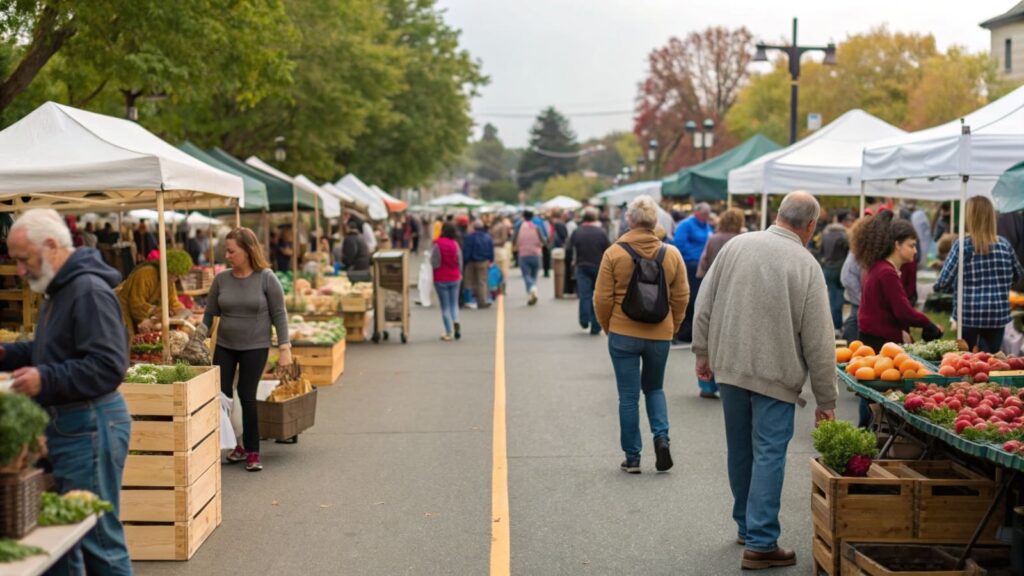
- Purpose: Flea market = resale, reuse, recycle. Farmers market = food straight from source.
- Pricing: Flea market? Everything’s negotiable. Farmers market? Not really. Sometimes you can get a deal near closing if a farmer doesn’t want to lug 40 pounds of zucchini home.
- Quality: At a flea market you gamble—sometimes jackpot, sometimes junk. Farmers market quality tends to be high and traceable. You can literally ask, “When was this lettuce picked?”
- Sustainability: Flea markets keep goods out of landfills. Farmers markets cut transport miles and often support regenerative practices. Different flavors of “green.”
Comparison Table for Skimmers
| Feature | Flea Market | Farmers Market |
|---|---|---|
| Goal | Buy/sell used goods, vintage, oddities | Direct sale of food from growers |
| What you buy | Furniture, clothes, antiques, random treasures | Fresh produce, meats, dairy, bread, honey |
| Who sells | Resellers, pickers, crafters | Farmers, bakers, beekeepers |
| Pricing | Negotiable, often cheap | Fixed, sometimes premium |
| Bargaining | Expected | Rare, maybe bulk |
| Quality | All over the map | Fresh, traceable |
| Returns | Usually none | Nope, but if the fruit’s bad, they’ll swap |
| Seasonality | Can run all year | Heavily seasonal |
| Best for | Bargains, decor, collectibles, DIY | Healthy cooking, ethical sourcing |
Pros, Cons, and Hard Truths
Flea Market Pros
- Dirt cheap if you’re good at haggling
- Weird, one-of-a-kind finds
- Keeps stuff in circulation instead of landfill
- Feels like a hunt (which is addictive)
Flea Market Cons
- Quality control? Nonexistent
- You waste time digging through piles of junk
- No refunds, no guarantees—buyer beware
Farmers Market Pros
- Produce that actually tastes alive
- You know where it came from—just ask
- Supports local agriculture directly
- Seasonal foods that shift your cooking habits
Farmers Market Cons
- Pricier than Safeway or Walmart
- Sell out early—you snooze, you lose
- Weather dependent, seasonal availability limited
Tips If You Go
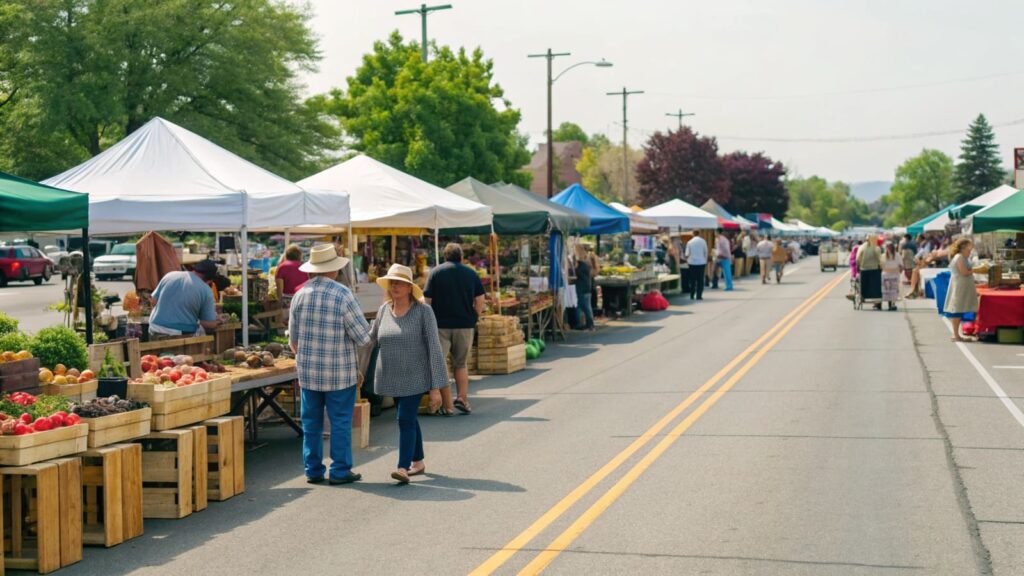
Surviving a Flea Market
- Cash is king. Small bills get you better deals.
- Go early for the good stuff, late for the desperate deals.
- Inspect everything. Plug it in, flip it over, shake it.
- Bundle items to bargain—3 things for one price.
- Don’t be a jerk. Smile, negotiate, walk away if it’s too much.
Farmers Market Hacks
- Show up early if you want strawberries. They vanish first.
- Bring bags. And maybe a cooler in the car for meat/dairy.
- Walk the whole place before buying—you’ll see price gaps.
- Ask questions. Farmers love to talk.
- Buy bulk and freeze/pickle/preserve. Makes the price sting less.
Real-Life Examples
- College kid setting up a first apartment: Hit a flea market. You’ll get a dresser, maybe a lamp, maybe a rug—all for what Ikea charges for a lamp.
- Couple planning Sunday brunch: Farmers market. Eggs, sourdough, tomatoes, herbs. Boom.
- Vintage collector hunting that missing Beatles record: Flea market.
- Meal prepper stocking veggies for the week: Farmers market.
- DIYer building a coffee table out of barn wood: Flea market.
- Gift shopping: Farmers market for honey, jam, or fancy cheese.
Bigger Picture: Impact on Community
Flea markets keep the reuse economy alive. They give side hustlers and hobbyists a place to test business ideas. And they preserve weird slices of culture—old signage, 70s glassware, forgotten toys.
Farmers markets? They’re engines for local food economies. They put more money in farmers’ pockets than wholesale ever could. They also teach kids that carrots don’t actually come shrink-wrapped.
Both build community. One through bargaining and storytelling over objects. The other through recipes, food education, and the simple act of feeding people.
Who Should Go Where
- Flea market crowd: Bargain hunters, thrifters, collectors, DIY fanatics.
- Farmers market crowd: Foodies, health-conscious families, sustainability folks, anyone who wants to know their farmer.
My Take (Because You Asked)
Some people will argue endlessly—flea vs farmers, which is better. Truth? They’re not competing. They scratch different itches.
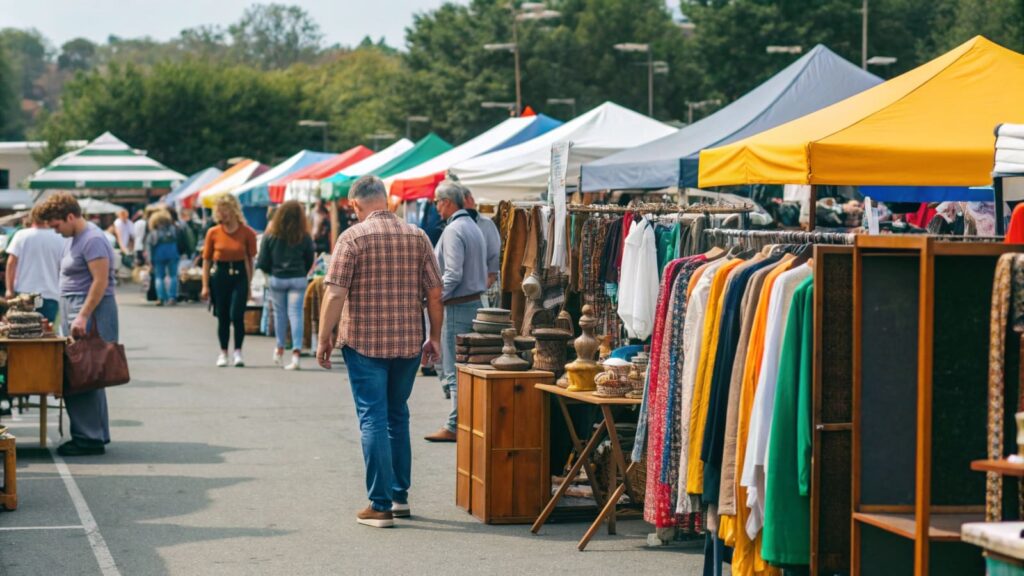
If money’s tight, or you want stuff with character, the flea market is unbeatable. You’ll come home broke or thrilled—or both.
If food is your priority, and you care about what’s on your plate, the farmers market wins hands down. Yeah, it’s pricier. But the taste difference is shocking once you notice.
Honestly? Hit both. Saturday for antiques and junk, Sunday for peaches and bread. Life’s short. Why not?
FAQ: Flea Market vs. Farmers Market
What’s the main difference between a flea market and a farmers market?
A flea market is all about used goods, vintage finds, quirky objects, and bargaining. Farmers markets are centered on food—fresh, local, seasonal, direct from growers.
Are flea markets cheaper than farmers markets?
Usually yes. Flea markets thrive on negotiation and low prices. Farmers markets reflect the cost of producing high-quality, small-scale food.
Can you haggle at farmers markets?
Not the same way you do at flea markets. You won’t negotiate a tomato, but some farmers offer bulk discounts or cut prices near closing.
Which market is better for families?
Farmers markets. Kids learn where food comes from, and the environment tends to be calmer and more educational. Though flea markets can be fun adventures too.
Do farmers markets only run in summer?
Not always. Some operate year-round with root veggies, preserved foods, and winter greens. Others shut down when growing season ends.
Are flea markets just full of junk?
Nope. You’ll find junk, yes, but also rare antiques, collectibles, and durable older furniture that outlasts new stuff.
Which is more sustainable?
Both in their own ways. Flea markets extend the life of products and reduce waste. Farmers markets shorten supply chains and support local agriculture.
Wrap It Up
Flea market or farmers market isn’t a fight—it’s a fork in the road. One leads to dusty treasures and bargain bragging rights. The other to juicy tomatoes and conversations about soil health. You can’t lose either way.
But if you’re forcing me to choose:
- Need cheap furniture or quirky decor? Flea market.
- Need fresh food and a sense of connection to what you eat? Farmers market.
